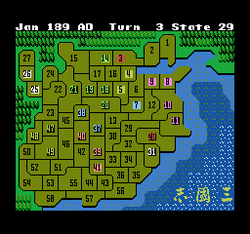Romance of the Three Kingdoms (video game series)
Romance of the Three Kingdoms (三國志, Sangokushi, lit. "Records of the Three Kingdoms") is a series of turn-based tactical role-playing simulation grand strategy wargames produced by Koei.[1][2] Originating from Japan in 1985, fourteen installments of the game have been published in Japan, Taiwan, China, South Korea and North America to date. While the game's title as it was released in English refers to the historical novel Romance of the Three Kingdoms (三國演義) by Luo Guanzhong, the title as it was released in Japan and Chinese regions refers to the historical text Records of the Three Kingdoms (三國志) by Chen Shou.
| Romance of the Three Kingdoms | |
|---|---|
 Romance of the Three Kingdoms for the Nintendo Entertainment System, with the logo in the bottom-right corner | |
| Genre(s) | Strategy |
| Developer(s) | Koei (now Koei Tecmo) |
| Publisher(s) | Koei (now Koei Temco) |
| Creator(s) | Yōichi Erikawa |
| First release | Romance of the Three Kingdoms 10 December 1985 |
| Latest release | Romance of the Three Kingdoms XIV 16 January 2020 |
| Spin-offs | Dynasty Warriors |
| Romance of the Three Kingdoms | |||||||
|---|---|---|---|---|---|---|---|
| Chinese name | |||||||
| Traditional Chinese | 三國志 | ||||||
| Simplified Chinese | 三国志 | ||||||
| Literal meaning | Records of the Three Kingdoms | ||||||
| |||||||
| Vietnamese name | |||||||
| Vietnamese | Tam quốc chí | ||||||
| Hán-Nôm | 三國志 | ||||||
| Korean name | |||||||
| Hangul | 삼국지 | ||||||
| Hanja | 三國志 | ||||||
| |||||||
| Japanese name | |||||||
| Kanji | 三國志 | ||||||
| Hiragana | さんごくし | ||||||
| |||||||
Overview
The series are based on the romanticized Romance of the Three Kingdoms novel and the historical text Records of the Three Kingdoms, the storyline takes place during the Han Dynasty in China with many warring factions that included the Shu Han, Cao Wei and Eastern Wu kingdoms. Gameplay revolves around managing numerical statistics, each representing an attribute of a city or a character. A city is described by statistics such as stored grain supplies, vulnerability to disasters such as floods and earthquakes, treasury funds, domestic affairs and populace loyalty. Characters are numerically characterized by their leadership abilities, melee prowess, intellects and loyalty, as well as special traits or even magical abilities that can be called upon whether during wartime, diplomacy or domestic affairs. Players can increase these numbers before waging war on neighbouring territories or intending diplomatic efforts.
While generally presented as a turn-based strategy game, the seventh, eighth and tenth editions offer role-playing features, allowing the player to play as a rank-and-file character instead of leading a kingdom.
Several spin-offs based on the series include the tactical action hack and slash video game Dynasty Warriors, Dynasty Tactics which is a hybrid of Dynasty Warriors and Romance of the Three Kingdoms, as well as the three tactical role-playing games Sangokushi Eiketsuden (Liu Bei), Sangokushi Koumeiden (Zhuge Liang), and Sangokushi Sousouden (Cao Cao). Kessen II is a real-time tactics game on PS2.
List of games in the series
The release dates provided are for original Japanese releases.
Main series
- Romance of the Three Kingdoms (1985, PC-88) – Also available on Amiga, MS-DOS, PC-98, MSX, NES (1988), FM-7, Sharp X1, Sharp X68000, WonderSwan, Windows (2003), mobile phones.
- Romance of the Three Kingdoms II (1989, PC-88) – Also available on Amiga, MS-DOS, MSX2, NES, SNES, Mega Drive (1989), Sharp X68000, WonderSwan, Windows (2000), mobile phones
- Romance of the Three Kingdoms III: Dragon of Destiny (1992, PC-98) – Also available on MS-DOS, SNES, Mega Drive (1992), Windows (2001), NDS (2006)
- Romance of the Three Kingdoms IV: Wall of Fire (1994, PC-98) – Also available on SNES, Sega 32X, MS-DOS, Sega Saturn, PlayStation (1994), Game Boy Advance, Windows (2001), NDS (2007)
- Romance of the Three Kingdoms V (1995, PC-98) – Also available on Sega Saturn, PlayStation, Windows (1995), PlayStation Portable (2005), NDS (2010), 3DS (2013)
- Romance of the Three Kingdoms VI: Awakening of the Dragon (1996, Windows) – Also available on PlayStation, Dreamcast (1996), PlayStation Portable (2005)
- Romance of the Three Kingdoms VII (2000, Windows) – Also available on PlayStation, PlayStation 2 (2000), PlayStation Portable (2006)
- Romance of the Three Kingdoms VIII (2001, Windows) – Also available on PlayStation 2 (2002), PlayStation Portable (2007)
- Romance of the Three Kingdoms IX (2003, Windows) – Also available on PlayStation 2 (2004), PlayStation Portable (2011)
- Romance of the Three Kingdoms X (2004, Windows) – Also available on PlayStation 2 (2005)
- Romance of the Three Kingdoms XI (2006, Windows) – Also available on PlayStation 2 (2006), Wii (2007)
- Romance of the Three Kingdoms XII (2012, Windows) – Also available on PlayStation 3, Wii U (2012), PlayStation Vita (2013)
- Romance of the Three Kingdoms XIII (2016, PlayStation 3, PlayStation 4, Xbox One and Windows) – Also available on Nintendo Switch and PlayStation Vita (2017)
- Romance of the Three Kingdoms XIV (2020, Windows, PlayStation 4)
Other games
- Kingdom Story: Brave Legion (2016, IOS, Android) developed by Picneko Creative, produced by Hangame.
- Super Sangokushi (SNES)
- Sangokushi Eiketsuden (SNES)
- Sangokushi Koumeiden
- Sangokushi Sousouden
- Sangokushi Internet (1999, Windows) - Koei's first online video game of the series, developed by Koei Taiwan.
- Kessen II (2001, PS2)
- Dynasty Tactics (2002, PS2)
- Sangokushi Battlefield (2002, Windows)
- Dynasty Tactics 2 (2003, PS2)
- Sangokushi Online (2007, Windows )
- Yo-kai Sangokushi (2015, Nintendo 3DS) - Crossover with Level-5's Yo-Kai Watch series
- Sangokushi Mobile (Mobile phones)
- Sangokushi Mobile 2 (Mobile phones)
- Sangokushi Mobile 3 (Mobile phones)
- Romance of the Three Kingdoms Touch (2009, iOS)
- Romance of the Three Kingdoms 2 (2010, iOS)
Reception
Sangokushi received positive critical reception in North America when it was released there in 1988. In Computer Gaming World, the game was reviewed by Dungeons & Dragons creator Dave Arneson, who wrote that it is "a great historical simulation and will keep players at their keyboards for many a night in order to win their empires. It has economics, intrigue, bribery, covert action, diplomacy, war, and more! There are many ways beyond simple conquest to accomplish one's goals." He concluded: "I most heartily recommend Romance to all serious game players out there."[3]
In December 1989, Computer Gaming World readers gave it an average rating of 8.96 out of 10, making it the magazine's 13th highest user-rated game at the time.[4] In 1990 and 1993 surveys of historical strategy and war games, the magazine gave Romance of the Three Kingdoms three-plus stars out of five.[5][6]
As of 2020, the series has shipped more than 8 million copies worldwide.[7]
References
- Romance of the Three Kingdoms, Encyclopædia Britannica
- "Romance of the Three Kingdoms". Legendra. Retrieved 2011-03-01.
- Dave Arneson (September 1988). "Romance of the Three Kingdoms". Computer Gaming World. No. 51. pp. 12–3, 31, 34.
- Ardai, Charles (December 1989). "The Top Ten Games". Computer Gaming World. p. 52. Retrieved 4 November 2013.
- Brooks, M. Evan (October 1990). "Computer Strategy and Wargames: Pre-20th Century". Computer Gaming World. p. 11. Retrieved 16 November 2013.
- Brooks, M. Evan (June 1993). "An Annotated Listing of Pre-20th Century Wargames". Computer Gaming World. p. 136. Retrieved 7 July 2014.
- https://www.agara.co.jp/article/61027
